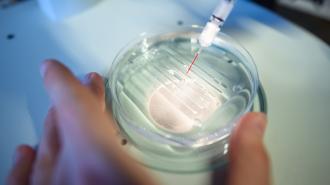A newly discovered “anti-CRISPR” system in viruses could help us control CRISPR gene-editing technologies and lead to better weapons against antibiotic-resistant superbugs.
The background: Your immune system has ways to remember viruses you’ve encountered before and help defend you if they appear again — and, amazingly, some single-celled bacteria do, too.
These microbes evolved the CRISPR system to protect themselves from the viruses that infect bacteria, called phages. The bacteria will take a little bit of a virus’ DNA sequence and add it to their own genome, like a memory of past infections. They then create CRISPR-associated (Cas) proteins containing copies of the viral genetic sequence, written in RNA.
Those Cas proteins then patrol the bacteria, waiting for a virus with the matching DNA sequence to show up again. If it does, the CRISPR system slices through the virus’ DNA to disable it.
“It’s like an evolutionary arms race.”
David Mayo-Muñoz
The challenge: That’s how CRISPR works in nature, but researchers have learned how to program the systems to match up with any desired genetic sequence — they can then deploy it to make precise edits to all kinds of DNA to treat diseases, improve crops, and more.
To take full advantage of CRISPR as a gene-editing tool, though, we need to figure out better ways to control it. Ideally, we’d want to be able to deploy the system, and then turn it off once it’s edited enough cells (or if it starts making edits in places it’s not supposed to).
A new anti-CRISPR: Researchers from the University of Otago and the University of Copenhagen have now discovered a new “anti-CRISPR” system that phages have evolved to get around bacteria’s defenses.
“It’s like an evolutionary arms race,” said co-first author David Mayo-Muñoz. “Bacteria have CRISPR-Cas, so the phages have developed anti-CRISPRs, which enables them to block the immune complexes of the bacteria.”
“This molecular mimic ruins the defenses of the bacteria … it’s basically a decoy.”
Peter Fineran
Researchers have found ways to use previously discovered anti-CRISPR systems as off-switches for CRISPR gene-editing systems, but those anti-CRISPRs all used proteins to prevent a bacteria’s CRISPR system from working.
This is the first anti-CRISPR system they’ve seen where the virus creates RNA that mimics the RNA in its host’s CRISPR system. The viral RNA then binds directly to the bacteria’s Cas proteins to disable them.
“This molecular mimic ruins the defenses of the bacteria and the function of the system; it’s basically a decoy,” said co-lead researcher Peter Fineran.
Looking ahead: The researchers believe it will be easier to find and use new RNA-based anti-CRISPRs than protein-based ones, and the more we can study, the better equipped we’ll be to use the systems to develop off-switches for CRISPR gene-editing tech.
Research into these anti-CRISPRs could also help us create new phage therapies, which use viruses that aren’t harmful to people to kill infections caused by antibiotic-resistant bacteria.
“If we’re able to equip phages with anti-CRISPR strategies, they would be more effective at taking over bacterial populations and killing nasty bugs,” researcher Rafael Pinilla-Redondo told Nature Podcast.
We’d love to hear from you! If you have a comment about this article or if you have a tip for a future Freethink story, please email us at [email protected].





